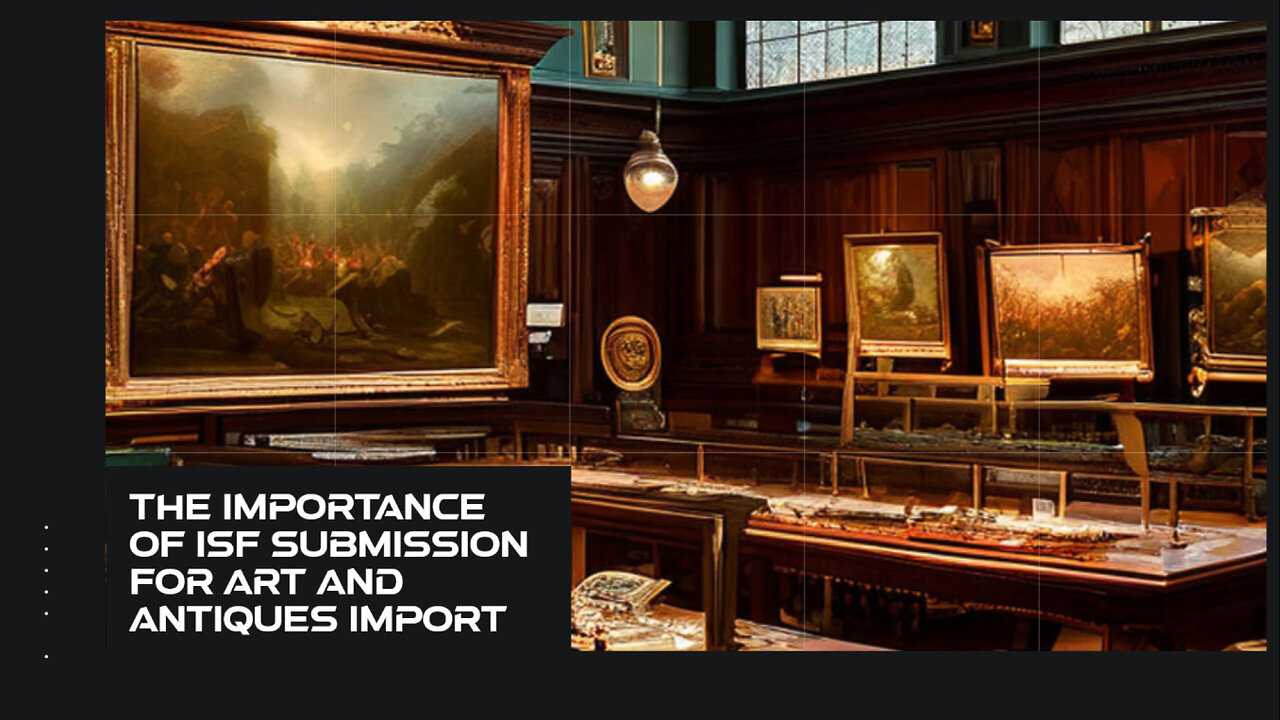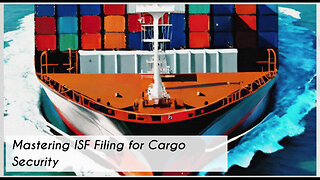Premium Only Content

The Importance of ISF 10 2 and Tariff Classifications for Machinery Imports
ISF Depot // 661-246-8217 // customs@isfdepot.com // www.isfdepot.com
Importing machinery requires the submission of an Importer Security Filing (ISF), also known as an 10+2. ISF 10+2 is a component of this filing and refers specifically to the requirement of providing the Harmonized System (HS) code for the imported machinery. The HS code is an internationally recognized classification system that assigns a unique code to each product based on its characteristics.
Customs tariff classifications play a vital role in the import process. They determine the duty rates, taxes, and any trade restrictions or regulations associated with specific products. The accurate classification of machinery is crucial as it impacts the cost and compliance of importing. A slight misclassification can lead to delays, financial penalties, or even the seizure of goods.
Determining the correct HS code for your imported machinery can be complex, but there are some steps you can follow. Firstly, identify the primary function and purpose of the machinery. Then, consider its composition, features, and any additional components or accessories. Next, research the HS code using reliable sources such as customs databases or consulting with experts in customs brokerage.
Navigating through the intricacies of customs tariff classifications can be overwhelming, especially for newcomers to international trade. That's why consulting with customs experts, such as customs brokers, is highly recommended. These professionals possess in-depth knowledge of customs regulations and can assist you in determining the correct HS code for your machinery imports, ensuring compliance and reducing any potential risks.
Incorrectly classifying machinery can lead to significant consequences. If an incorrect HS code is provided, customs authorities may impose penalties or seize the imported goods for further examination. Moreover, if a lower duty rate is claimed by misclassifying, there is the risk of being audited and charged with customs fraud. To avoid these issues, it is crucial to ensure proper classification with the help of customs experts.
Tariff classifications may need updating over time, especially if modifications or enhancements are made to the machinery. It is essential to review and reassess the HS code periodically to ensure ongoing compliance. Failure to update classifications can result in incorrect duty payments, audits, or even legal consequences. Stay proactive and make necessary updates whenever changes occur.
Understanding ISF 10+2 and customs tariff classifications is essential for importing machinery successfully. Properly identifying the correct HS code, consulting with customs experts, and staying proactive in classification updates are key steps towards a compliant and hassle-free import process.
#usimportbond #isfcustomsbroker #uscustomsclearing #isfentry
Video Disclaimer Here: This tutorial is independent and not affiliated with any US governmental entities.
-
 3:56
3:56
ISF Depot
5 days agoProactive Cargo Security: Harnessing the Power of the ISF Filing Code
7 -
 LIVE
LIVE
Timcast
1 hour agoGavin Newsom SURGES In Polls, COPIES Trump's Style
25,792 watching -
 LIVE
LIVE
Right Side Broadcasting Network
4 hours agoLIVE: White House Press Secretary Karoline Leavitt Holds a Press Briefing - 8/19/25
3,227 watching -
 10:45
10:45
Dr. Nick Zyrowski
1 day agoDoctors Got It Wrong! This Causes of Obesity - NOT Sugar
8776 -
 LIVE
LIVE
Side Scrollers Podcast
1 hour agoEveryone Hates MrBeast + FBI Spends $140k on Pokemon + All Todays News | Side Scrollers Live
300 watching -
 LIVE
LIVE
The Charlie Kirk Show
1 hour agoSummit Aftermath + America's Energy Revolution + Where Russiagate Will Lead | Wright, Solomon
4,224 watching -
 2:00:15
2:00:15
Steven Crowder
3 hours agoTrump's Huge Meeting Shocks the World & the Media is Dumbfounded
182K146 -
 LIVE
LIVE
Viss
1 hour ago🔴LIVE - How to Consistently Win in PUBG!
117 watching -
 LIVE
LIVE
GloryJean
2 hours agoSniping & Dominating Solos 🖱️ 6.7 K/D
42 watching -
 1:40:15
1:40:15
Nikko Ortiz
2 hours agoLive - News, Politics, Podcast And Naaah Im Playin We Chillen
18.8K4